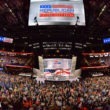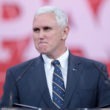Year of the Immigrant—On the final weekend of the year both the New York Times and National Public Radio focused on the illegal immigrant as the bête noire of Republican presidential-primary politics. On the same weekend the Dallas Morning News declared “The Illegal Immigrant” its person of the year.
The award has a considerable shelf life; it’s already evident that the illegal immigrant will be the GOP’s person of the year for 2008. Mitt Romney tried to energize his campaign in Iowa with TV spots blasting Mike Huckabee for supporting in-state tuition for children of undocumented immigrants living in Arkansas when Huckabee was governor. Romney’s campaign also sent direct mail to Iowa Republicans, describing Huckabee as soft on illegal immigration—even after Huckabee atoned by enlisting the support of Jim Gilchrist, the leader of the anti-immigration Minutemen militias, who patrol the U.S-Mexico border. Huckabee also replaced his nuanced position on immigration with a promise to require all 12 million immigrants illegally residing in the U.S. to leave the country within three months—a measure that would paralyze agriculture in California, Oregon and Washington the day everyone got on the bus.
While the Times, NPR and the Morning News focused on illegal immigration, the Federation for American Immigration Reform (FAIR) convened twenty talk-radio hosts and several Republican presidential candidates at the Marriott in Des Moines for a marathon session on immigration. FAIR has been described by the Southern Poverty Law Center as a “hate group.” The Anti-Defamation League plumbs the same theme in an “Immigrants Targeted” report, published on its website. “Under the guise of warning about the impact of illegal immigration,” said ADL director Abraham Foxman, “some anti-immigrant groups reached for the playbook of hate groups. They have taken hateful and racist rhetoric and brought it into the mainstream.”
George W. Bush was the first Republican presidential candidate to make an effort to speak Spanish and reach out to Hispanic voters. The Bush Hispanic plurality has disappeared as Republican candidates take aim at illegal immigrants, with an obvious focus on Mexicans.
Hanging Chads in Islamabad—New York University scholar Barnett Rubin’s analysis of the assassination of Benazir Bhutto in Pakistan and the state of politics there provides more context, insight and fact than the accumulated work of many pundits and journalists trying to puzzle through what happened in Rawalpindi on December 27. Published January 1 on Juan Cole’s website, Rubin’s report takes readers beyond the “terrible simplification” that informs Bush/Cheney foreign policy: that the Islamic world is divided between two camps, “pro-American moderates” and “anti-American extremists.”
While Rubin, an author and scholar focused on Pakistani and Afghan affairs, leans toward the hypothesis that the deadly attack on Bhutto was carried out by organizations connected to Al Qaeda, he argues that relationships between jihadi organizations and the Pakistani military make it impossible to absolve President Musharraf’s regime. Bhutto’s leadership of a genuine opposition movement had made it almost certain that Musharraf’s party and the military were about to lose control of Pakistan. The prospect of Bhutto’s Pakistan People’s Party forming a government with the PMLN Party of former prime minister Nawaz Sharif was (and remains) unacceptable to Musharraf.
Rubin cites an article published December 11 in the Pakistani newspaper Dawn, predicting with precision the election results a month before the now rescheduled vote. The election, Dawn wrote, would (and still might) be rigged through the use of “ghost polling places” that Pakistani Intelligence (ISI) Electoral Cells have used in previous elections. Dawn‘s predicted election fix had Musharraf’s PMLQ first, Bhutto’s PPP second, and Sharif’s PMLN third, with Islamist parties that had been allied with the military when it supported the Afghan Taliban winning enough seats to hold the balance of power. Musharraf could not allow Bhutto to win, because her victory would have brought the prospect of civilian control of the Pakistani military. That’s a military using substantial U.S. aid to “build a powerful militarized state in Pakistan, representing the heritage of Islamic empires in South and Central Asia”—not exactly a pro-American institution partnering with the Bush administration. It also has a nuclear arsenal.






0 Comments